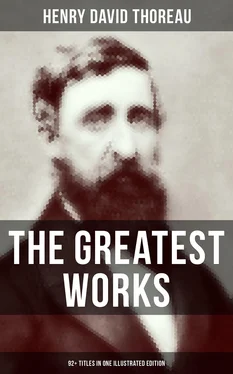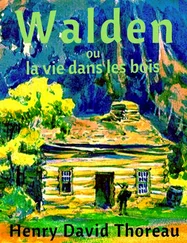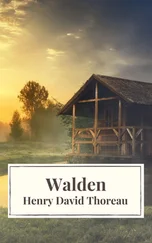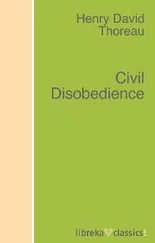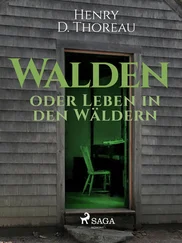Now only a dent in the earth marks the site of these dwellings, with buried cellar stones, and strawberries, raspberries, thimble-berries, hazel-bushes, and sumachs growing in the sunny sward there; some pitch pine or gnarled oak occupies what was the chimney nook, and a sweet-scented black birch, perhaps, waves where the door-stone was. Sometimes the well dent is visible, where once a spring oozed; now dry and tearless grass; or it was covered deep — not to be discovered till some late day — with a flat stone under the sod, when the last of the race departed. What a sorrowful act must that be — the covering up of wells! coincident with the opening of wells of tears. These cellar dents, like deserted fox burrows, old holes, are all that is left where once were the stir and bustle of human life, and “fate, free will, foreknowledge absolute,” in some form and dialect or other were by turns discussed. But all I can learn of their conclusions amounts to just this, that “Cato and Brister pulled wool”; which is about as edifying as the history of more famous schools of philosophy.
Still grows the vivacious lilac a generation after the door and lintel and the sill are gone, unfolding its sweet-scented flowers each spring, to be plucked by the musing traveller; planted and tended once by children’s hands, in front-yard plots — now standing by wallsides in retired pastures, and giving place to new-rising forests; — the last of that stirp, sole survivor of that family. Little did the dusky children think that the puny slip with its two eyes only, which they stuck in the ground in the shadow of the house and daily watered, would root itself so, and outlive them, and house itself in the rear that shaded it, and grown man’s garden and orchard, and tell their story faintly to the lone wanderer a half-century after they had grown up and died — blossoming as fair, and smelling as sweet, as in that first spring. I mark its still tender, civil, cheerful lilac colors.
But this small village, germ of something more, why did it fail while Concord keeps its ground? Were there no natural advantages — no water privileges, forsooth? Ay, the deep Walden Pond and cool Brister’s Spring — privilege to drink long and healthy draughts at these, all unimproved by these men but to dilute their glass. They were universally a thirsty race. Might not the basket, stable-broom, mat-making, corn-parching, linen-spinning, and pottery business have thrived here, making the wilderness to blossom like the rose, and a numerous posterity have inherited the land of their fathers? The sterile soil would at least have been proof against a low-land degeneracy. Alas! how little does the memory of these human inhabitants enhance the beauty of the landscape! Again, perhaps, Nature will try, with me for a first settler, and my house raised last spring to be the oldest in the hamlet.
I am not aware that any man has ever built on the spot which I occupy. Deliver me from a city built on the site of a more ancient city, whose materials are ruins, whose gardens cemeteries. The soil is blanched and accursed there, and before that becomes necessary the earth itself will be destroyed. With such reminiscences I repeopled the woods and lulled myself asleep.
At this season I seldom had a visitor. When the snow lay deepest no wanderer ventured near my house for a week or fortnight at a time, but there I lived as snug as a meadow mouse, or as cattle and poultry which are said to have survived for a long time buried in drifts, even without food; or like that early settler’s family in the town of Sutton, in this State, whose cottage was completely covered by the great snow of 1717 when he was absent, and an Indian found it only by the hole which the chimney’s breath made in the drift, and so relieved the family. But no friendly Indian concerned himself about me; nor needed he, for the master of the house was at home. The Great Snow! How cheerful it is to hear of! When the farmers could not get to the woods and swamps with their teams, and were obliged to cut down the shade trees before their houses, and, when the crust was harder, cut off the trees in the swamps, ten feet from the ground, as it appeared the next spring.
In the deepest snows, the path which I used from the highway to my house, about half a mile long, might have been represented by a meandering dotted line, with wide intervals between the dots. For a week of even weather I took exactly the same number of steps, and of the same length, coming and going, stepping deliberately and with the precision of a pair of dividers in my own deep tracks — to such routine the winter reduces us — yet often they were filled with heaven’s own blue. But no weather interfered fatally with my walks, or rather my going abroad, for I frequently tramped eight or ten miles through the deepest snow to keep an appointment with a beech tree, or a yellow birch, or an old acquaintance among the pines; when the ice and snow causing their limbs to droop, and so sharpening their tops, had changed the pines into fir trees; wading to the tops of the highest hills when the show was nearly two feet deep on a level, and shaking down another snow-storm on my head at every step; or sometimes creeping and floundering thither on my hands and knees, when the hunters had gone into winter quarters. One afternoon I amused myself by watching a barred owl (Strix nebulosa) sitting on one of the lower dead limbs of a white pine, close to the trunk, in broad daylight, I standing within a rod of him. He could hear me when I moved and cronched the snow with my feet, but could not plainly see me. When I made most noise he would stretch out his neck, and erect his neck feathers, and open his eyes wide; but their lids soon fell again, and he began to nod. I too felt a slumberous influence after watching him half an hour, as he sat thus with his eyes half open, like a cat, winged brother of the cat. There was only a narrow slit left between their lids, by which be preserved a pennisular relation to me; thus, with half-shut eyes, looking out from the land of dreams, and endeavoring to realize me, vague object or mote that interrupted his visions. At length, on some louder noise or my nearer approach, he would grow uneasy and sluggishly turn about on his perch, as if impatient at having his dreams disturbed; and when he launched himself off and flapped through the pines, spreading his wings to unexpected breadth, I could not hear the slightest sound from them. Thus, guided amid the pine boughs rather by a delicate sense of their neighborhood than by sight, feeling his twilight way, as it were, with his sensitive pinions, he found a new perch, where he might in peace await the dawning of his day.
As I walked over the long causeway made for the railroad through the meadows, I encountered many a blustering and nipping wind, for nowhere has it freer play; and when the frost had smitten me on one cheek, heathen as I was, I turned to it the other also. Nor was it much better by the carriage road from Brister’s Hill. For I came to town still, like a friendly Indian, when the contents of the broad open fields were all piled up between the walls of the Walden road, and half an hour sufficed to obliterate the tracks of the last traveller. And when I returned new drifts would have formed, through which I floundered, where the busy northwest wind had been depositing the powdery snow round a sharp angle in the road, and not a rabbit’s track, nor even the fine print, the small type, of a meadow mouse was to be seen. Yet I rarely failed to find, even in midwinter, some warm and springly swamp where the grass and the skunk-cabbage still put forth with perennial verdure, and some hardier bird occasionally awaited the return of spring.
Sometimes, notwithstanding the snow, when I returned from my walk at evening I crossed the deep tracks of a woodchopper leading from my door, and found his pile of whittlings on the hearth, and my house filled with the odor of his pipe. Or on a Sunday afternoon, if I chanced to be at home, I heard the cronching of the snow made by the step of a long-headed farmer, who from far through the woods sought my house, to have a social “crack”; one of the few of his vocation who are “men on their farms”; who donned a frock instead of a professor’s gown, and is as ready to extract the moral out of church or state as to haul a load of manure from his barn-yard. We talked of rude and simple times, when men sat about large fires in cold, bracing weather, with clear heads; and when other dessert failed, we tried our teeth on many a nut which wise squirrels have long since abandoned, for those which have the thickest shells are commonly empty.
Читать дальше
